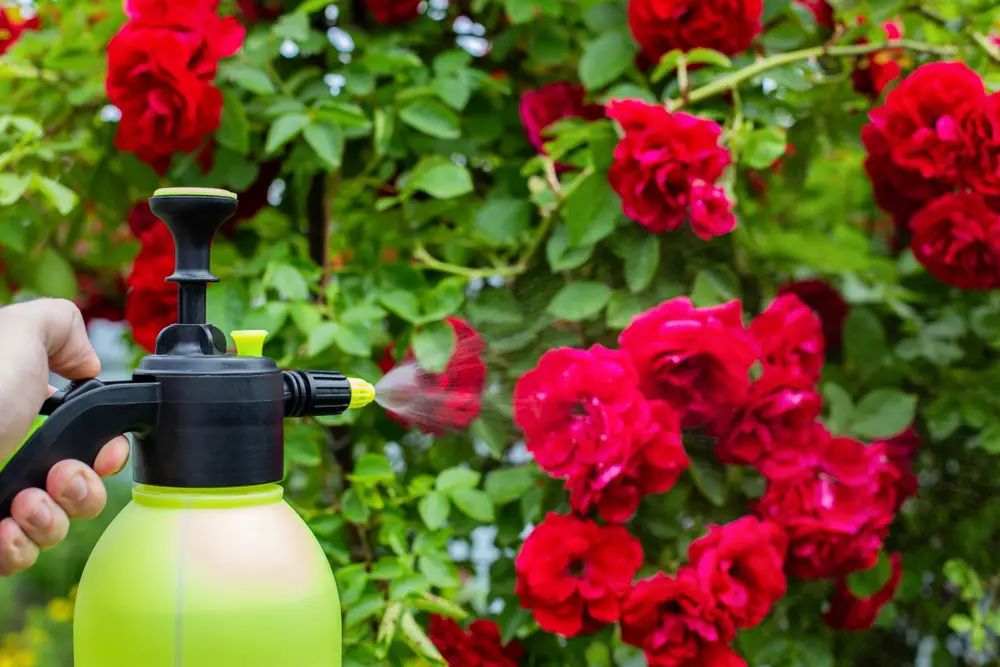If you’re looking to enjoy your outdoor spaces without the constant nuisance of insects you don’t always have to use bug spray for yard, there are many options available to you.
Commercial bug spray for yard have pros and cons. They are easy to use and work to eradicate mosquitoes, ants, and other common backyard pests. However, you need to be aware of the environmental risks of chemical pesticides, they are extremely toxic to beneficial pollinators, animals, and aquatic life!
For households with pets or small children, the use of chemical treatments may require extra caution and consideration.
The reliance on chemical insecticides directly affects our ecosystems, there are more eco-friendly or natural alternatives that are better for the environment.
Read on to learn everything you need to know about outdoor bug sprays and other available options to help you create a more pleasant environment for family gatherings and outdoor activities.
How Outdoor Bug Spray Works
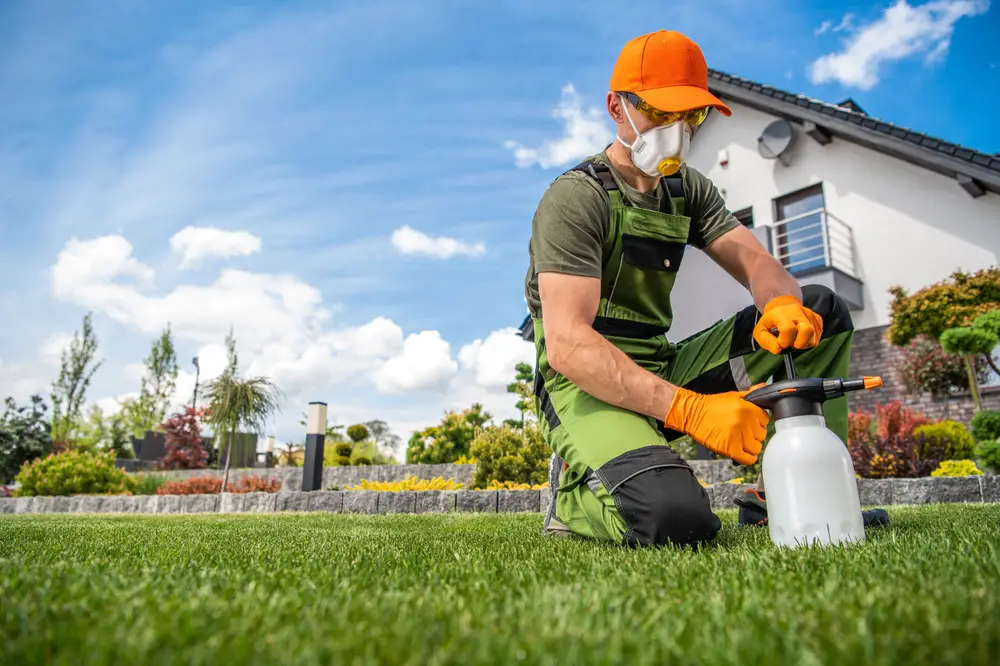
Outdoor bug spray formula usually includes synthetic bug control compounds such as lambda-cyhalothrin insecticide, which is a type of pyrethroid insecticide. This powerful ingredient mimics natural insecticides found in chrysanthemum flowers, disrupting the nervous systems of insects and killing them.
Most chemical pesticides involve a dual-action mechanism: first, the product acts on contact, killing insects that come into direct contact with the sprayed areas. Second, it offers residual protection, continuing to repel and kill pests over an extended period, which helps prevent future infestations.
However, as with any pest control product, bug spray for yard results can vary based on factors like application method, environmental conditions, and the severity of the infestation.
Is Bug Spray For Backyard Safe For Plants?
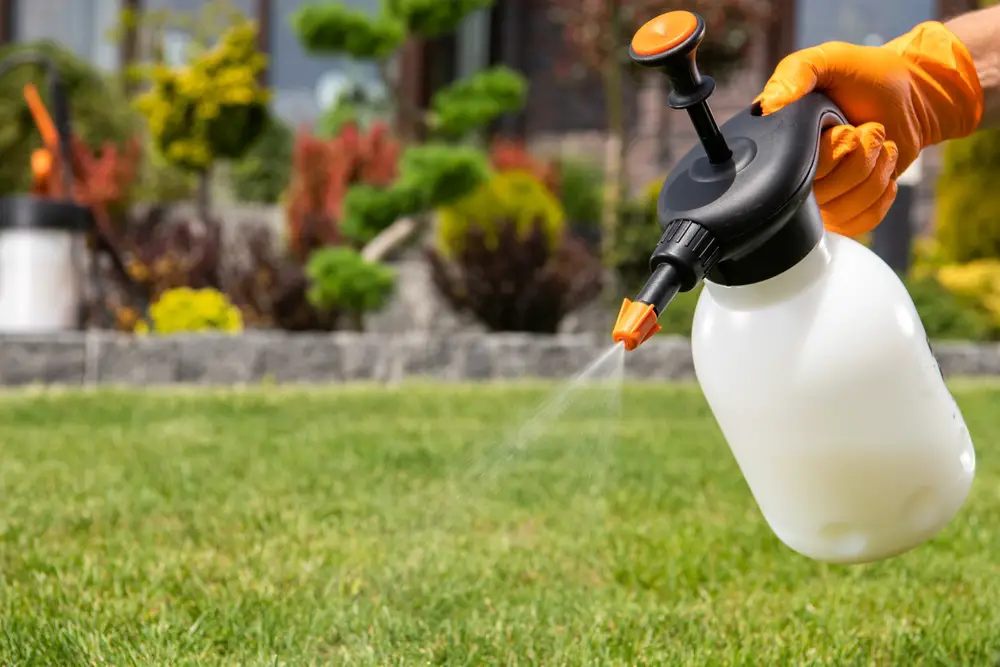
Most are considered safe for plants as that is what they are intended to be sprayed on. But it’s important to understand its potential impact on plants and garden health.
Commercial outdoor bug spray is designed to target a broad range of outdoor pests and can be used on lawns, plants, grass, shrubs, and flowers.
While the effects of bug spray for your yard are generally safe for many types of plants, including ornamental trees and shrubs, it’s crucial to test the product on a small area first to ensure it does not adversely affect sensitive plants.
Some plants might react negatively, so monitoring the test area for any signs of distress is recommended.
How Chemical Bug Spray For Yard Affects Our Environment
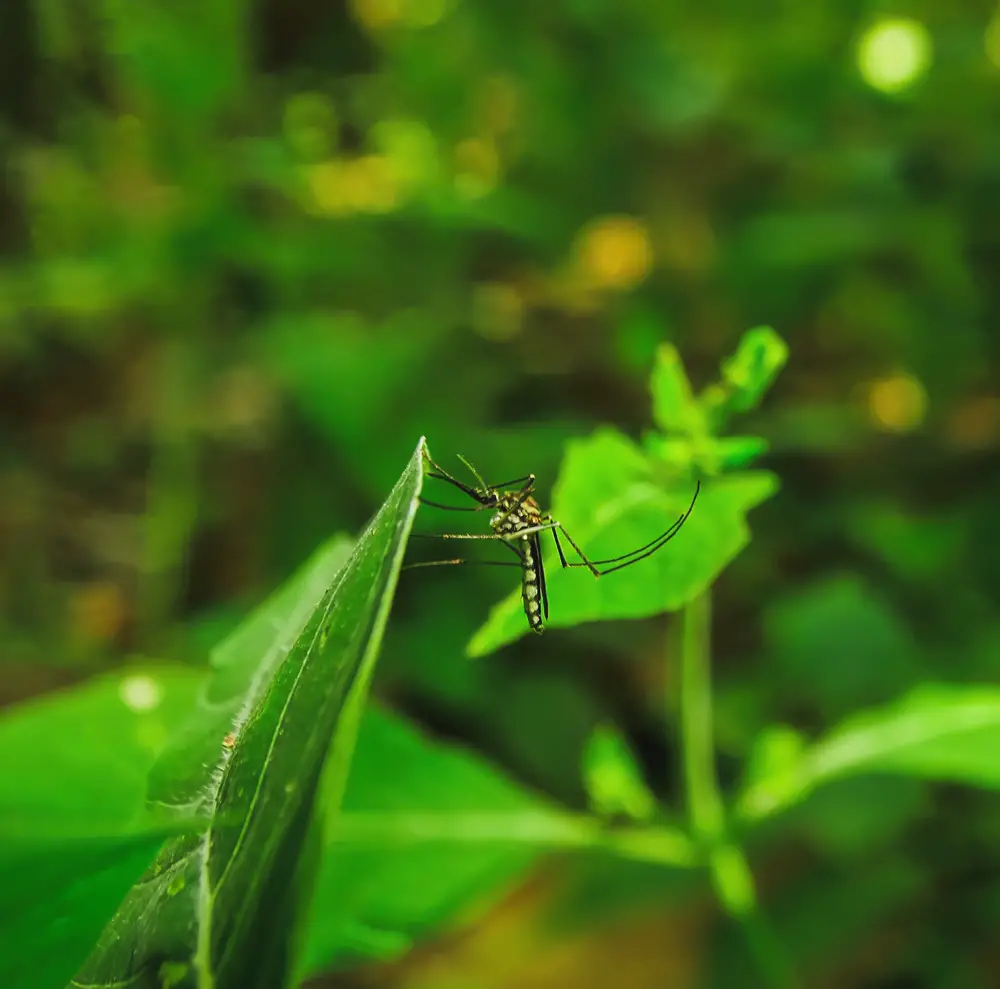
Using outdoor bug spray also comes with risks. Insects targeted by chemical bug sprays for yard are not only pesky bugs like mosquitoes and ants but they also kill good insects like bees and other beneficial pollinators.
The environmental impact of chemical pesticides is significant. It is essential to avoid using sprays near water sources. Some potential environmental effects are:
| Environmental Impact and Precautions | |
| Aquatic life | Can be highly toxic to fish and other aquatic organisms and aquatic invertebrates |
| Pollinators | Extremely toxic to bees when directly or indirectly exposed. DO NOT use on blooms or weeds frequented by bees |
| Coastal Areas | For example, in New York state, some commercial products are not permitted for use on lawns with 100 feet (30.48 meters) of coastal marshes or streams that run to coastal marshes |
| Water | DO NOT allow product to contaminate water, drains, run-off, gutters, or surface water |
Safety Considerations For Pets And Children

When using any chemical outdoor bug spray, it’s essential to consider the safe use around pets and children. Ensure the bug spray for yard is used in a way that minimizes exposure to pets and children, adhering to any safety precautions on the label.
To prevent overexposure risks, avoid areas where the product might run off and follow protective measures closely.
Always prioritize pet-friendly outdoor bug spray practices, it is worth considering non-chemical alternatives to maintain a safe environment around pets and children.
When Not To Use Bug Spray For Yard
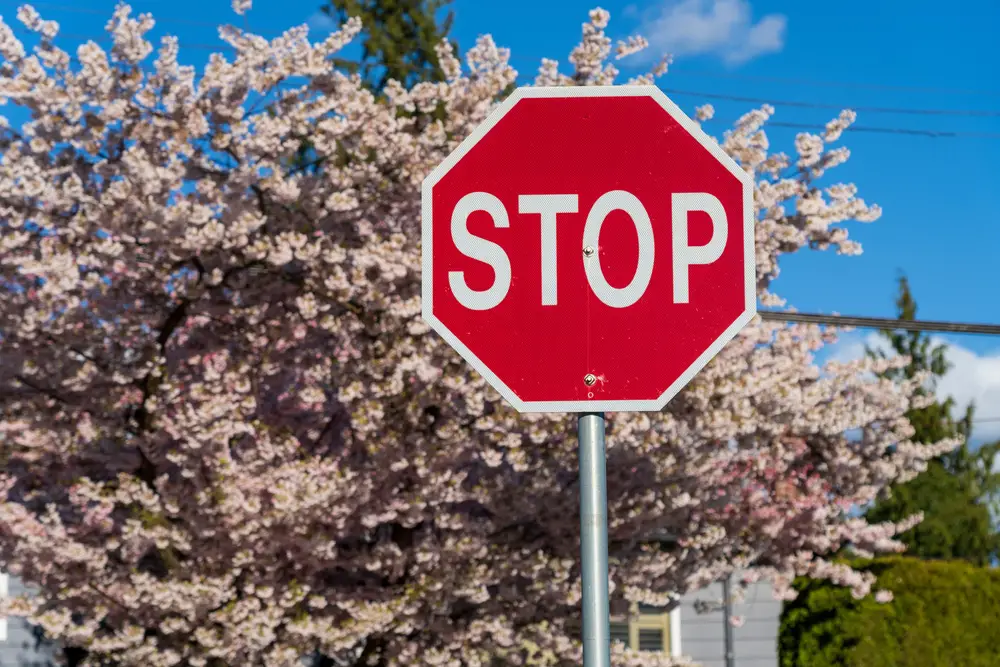
Inappropriate use of bug spray for yard includes applying the product in non-recommended areas, such as indoor and sensitive plants. Avoid using chemical bug spray for yards on vegetables.
In addition, the overuse of pesticides can actually create more pest problems than it solves.
General guidelines include:
❌ Do not use near bees or areas where they visit
❌ Do not use on water or near waterways
❌ Do not use near heat
❌ Do not use near open flame
❌ Do not use near electrical equipment
❌ Do not expose to heat above 130°C (54°F)
To prevent potential harm to your garden and indoor spaces, avoid using on:
- Vegetables
- Edible plants
- Indoor plants
- Greenhouse plants
- Sensitive plants
- Coastal Areas
- Areas with run-off
Better Alternatives For Bug-Free Living
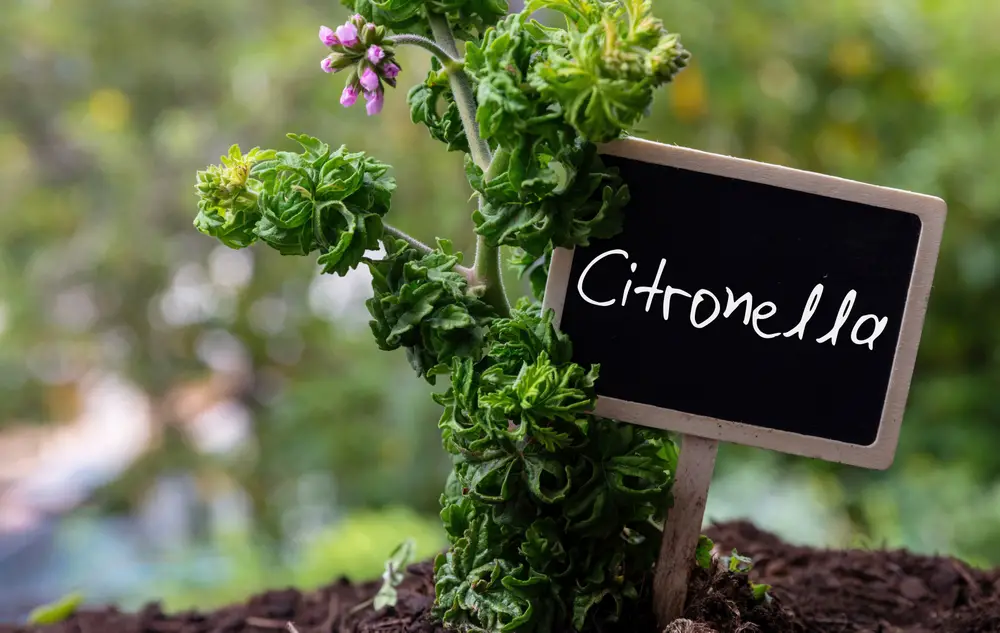
Whether it’s for playing with the kids or family get-togethers, there are many eco-friendly and natural pest control alternatives to outdoor bug sprays available to help you enjoy your outdoor spaces.
Here are our recommendations for bug control products and organic pesticides:
Neem Oil Vs Bug Spray For Yard
Neem oil comes from the seeds of the neem tree and is considered a natural and organic pest control option. It disrupts the life cycle of insects, preventing them from feeding and reproducing.
Neem oil has a much lower environmental impact compared to synthetic chemical compounds found in outdoor bug spray. It breaks down naturally and has minimal effects on beneficial insects when used correctly.
Neem oil is effective against a wide range of pests, including:
- Aphids
- Spider mites
- Whiteflies
It is also effective in treating fungal diseases so it acts as both an insecticide and a fungicide.
How To Apply Neem Oil
Neem oil needs to be diluted with water before application. It can be used as a foliar spray or soil drench.
You can buy easy-to-use ready-made neem oil sprays.
Reapplication may be required to maintain effectiveness.
Pet-Friendly Bug Control
You don’t want to be worrying about Fido while you’re throwing a ball around the yard. So, consider using pet-safe pesticides.
A good choice is Botanical Extracts Yard & Kennel Spray. This utilizes cinnamon, cedar, and clove oil to repel pesky bugs while protecting your pooch. It also attaches to your garden hose for ease of application. Its formula works on:
- Fleas
- Ticks
- Blackflies
- Mosquitoes
Diatomaceous Earth Benefits
Diatomaceous earth offers several benefits for bug control:
- Natural and Non-Toxic: Diatomaceous earth is a natural substance made from the fossilized remains of microscopic organisms called diatoms. It is non-toxic to humans and pets, making it a safer alternative to chemical pesticides.
- Effective Against a Broad Range of Pests: Diatomaceous earth damages the exoskeletons of insects, leading to dehydration and death. It is effective against a variety of pests, including ants, fleas, bedbugs, and cockroaches.
- Environmentally Friendly: Diatomaceous earth does not contribute to environmental pollution, disrupt ecosystems, and it doesn’t leave harmful residues.
- Long-Lasting Protection: Diatomaceous earth is effective as long as it is dry.
- Easy to Apply: Easily apply it in powder form or mixed with water for spraying. It can be used in various settings, including homes, gardens, and barns, without special equipment.
- Safe for Beneficial Insects: Unlike chemical pesticides that can harm beneficial insects, diatomaceous earth primarily targets pests with exoskeletons, leaving most beneficial insects unharmed when used correctly.
Natural Mosquito Repellents
There are many plants that you can incorporate into your garden to act as a natural mosquito repellent. Many of them are also edible so you can keep the bugs away and feed your family too!
Here are the top 10 plants to repel mosquitoes (citronella is top on our list!):
- Citronella: One of the most well-known mosquito-repellent plants, citronella grass contains oils that effectively ward off mosquitoes. It’s often used in candles and sprays. I have several citronella plants in pots on my decks and balconies.
- Lavender: The beautiful strong scent of lavender not only makes it a pleasant addition for humans but also helps repel mosquitoes. Its oil is commonly used in mosquito-repelling products.
- Marigolds: Marigold flowers contain compounds that mosquitoes find unpleasant, making them an effective deterrent. They are also pretty and add color to gardens!
- Basil: Basil has a strong aroma that mosquitoes dislike. Varieties like lemon basil and cinnamon basil are particularly effective. Delicious to eat too!
- Rosemary: Mosquitoes dislike the woody scent of rosemary. It’s great for cooking.
- Mint: Various types of mint, such as spearmint and peppermint, repel mosquitoes with their strong scent. Mint is very invasive, so try planting in pots or planters.
- Catnip: Catnip contains nepetalactone, a compound effective in repelling mosquitoes. Just be aware you might attract all the neighborhood cats!
- Eucalyptus: This is a common ingredient in mosquito repellents. They dislike the strong aroma.
- Lemon Balm: This herb has a citrusy aroma that mosquitoes find unappealing. It’s easy to grow and can be used in teas or as a garnish.
- Garlic: This plant has so many uses! The pungent scent repels mosquitoes and is a staple in the kitchen.
Final Thoughts and Recommendations
Should you use chemical outdoor bug spray? The decision is ultimately up to you. But you do need to be aware of the environmental impact. There are many better alternatives to bug sprays for backyard that provide effective bug control solutions.
Chemical pesticides are extremely toxic and pose significant risks to both the environment and the ecosystem. These substances can contaminate soil and water, harming plants, animals, and beneficial insects.
The persistent use of chemicals disrupts natural processes and can lead to long-term damage to ecosystems, reducing biodiversity, and affecting the health of wildlife. Additionally, the chemicals in these pesticides can persist in the environment, potentially impacting human health through water and food supplies.
For a safer and more sustainable approach, it’s essential to consider eco-friendly pest control solutions that minimize harm to the environment.

